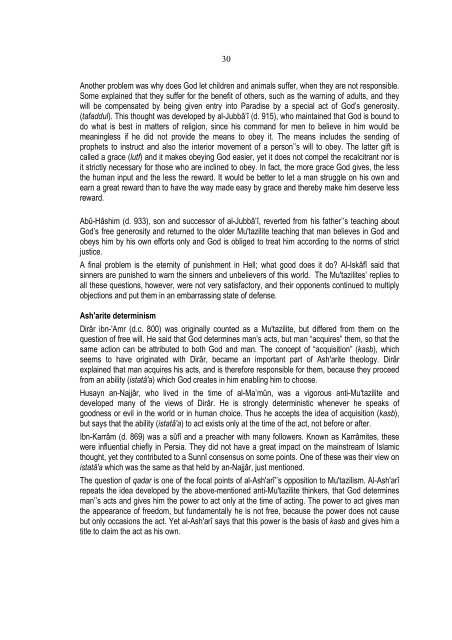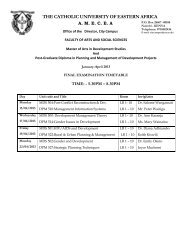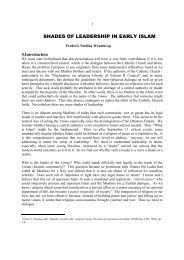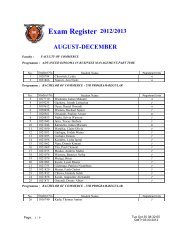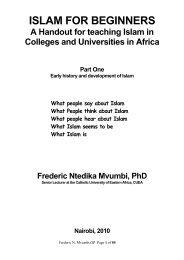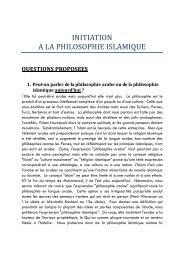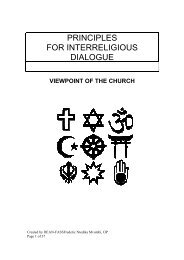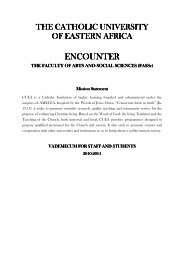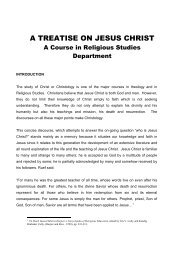INTRODUCTION TO ISLAMIC THEOLOGY.pdf - CUEA
INTRODUCTION TO ISLAMIC THEOLOGY.pdf - CUEA
INTRODUCTION TO ISLAMIC THEOLOGY.pdf - CUEA
You also want an ePaper? Increase the reach of your titles
YUMPU automatically turns print PDFs into web optimized ePapers that Google loves.
30Another problem was why does God let children and animals suffer, when they are not responsible.Some explained that they suffer for the benefit of others, such as the warning of adults, and theywill be compensated by being given entry into Paradise by a special act of God’s generosity.(tafaddul). This thought was developed by al-Jubbâ’î (d. 915), who maintained that God is bound todo what is best in matters of religion, since his command for men to believe in him would bemeaningless if he did not provide the means to obey it. The means includes the sending ofprophets to instruct and also the interior movement of a person’’s will to obey. The latter gift iscalled a grace (lutf) and it makes obeying God easier, yet it does not compel the recalcitrant nor isit strictly necessary for those who are inclined to obey. In fact, the more grace God gives, the lessthe human input and the less the reward. It would be better to let a man struggle on his own andearn a great reward than to have the way made easy by grace and thereby make him deserve lessreward.Abû-Hâshim (d. 933), son and successor of al-Jubbâ’î, reverted from his father’’s teaching aboutGod’s free generosity and returned to the older Mu'tazilite teaching that man believes in God andobeys him by his own efforts only and God is obliged to treat him according to the norms of strictjustice.A final problem is the eternity of punishment in Hell; what good does it do? Al-Iskâfî said thatsinners are punished to warn the sinners and unbelievers of this world. The Mu'tazilites’ replies toall these questions, however, were not very satisfactory, and their opponents continued to multiplyobjections and put them in an embarrassing state of defense.Ash'arite determinismDirâr ibn-'Amr (d.c. 800) was originally counted as a Mu'tazilite, but differed from them on thequestion of free will. He said that God determines man’s acts, but man “acquires” them, so that thesame action can be attributed to both God and man. The concept of “acquisition” (kasb), whichseems to have originated with Dirâr, became an important part of Ash'arite theology. Dirârexplained that man acquires his acts, and is therefore responsible for them, because they proceedfrom an ability (istatâ'a) which God creates in him enabling him to choose.Husayn an-Najjâr, who lived in the time of al-Ma’mûn, was a vigorous anti-Mu'tazilite anddeveloped many of the views of Dirâr. He is strongly deterministic whenever he speaks ofgoodness or evil in the world or in human choice. Thus he accepts the idea of acquisition (kasb),but says that the ability (istatâ'a) to act exists only at the time of the act, not before or after.Ibn-Karrâm (d. 869) was a sûfî and a preacher with many followers. Known as Karrâmites, thesewere influential chiefly in Persia. They did not have a great impact on the mainstream of Islamicthought, yet they contributed to a Sunnî consensus on some points. One of these was their view onistatâ'a which was the same as that held by an-Najjâr, just mentioned.The question of qadar is one of the focal points of al-Ash'arî’’s opposition to Mu'tazilism. Al-Ash'arîrepeats the idea developed by the above-mentioned anti-Mu'tazilite thinkers, that God determinesman’’s acts and gives him the power to act only at the time of acting. The power to act gives manthe appearance of freedom, but fundamentally he is not free, because the power does not causebut only occasions the act. Yet al-Ash'arî says that this power is the basis of kasb and gives him atitle to claim the act as his own.


